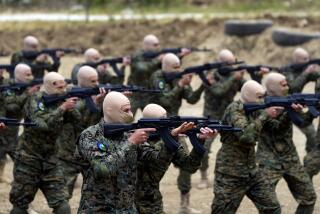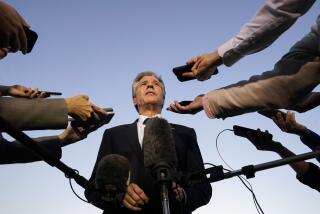With Latest Raids, Gulf War Coalition Starting to Splinter : Diplomacy: U.S. officials concede that discord within 29-nation alliance served to limit actions against Iraq.
- Share via
WASHINGTON — Two years after the Persian Gulf War, the U.S.-led coalition showed signs of strain on Monday after a third round of raids against Iraq.
American officials conceded that the discord was responsible, in part, for the relatively limited military response to Baghdad’s latest transgressions.
Russia on Monday called on Washington not to engage in further punitive actions against Iraq without approval from the U.N. Security Council. Key Arab players, including Jordan and the Arab League, also issued statements Monday warning of a serious backlash in the Arab and Muslim worlds.
Even before the new expressions of unease, senior U.S. officials said that American decisions on options for the U.S.-led strikes against Iraq since last Wednesday were shaped largely by concern that the coalition might be fraying.
“The issue is not if the Administration would like to have done more,” said one ranking U.S. source. “The issue is what makes good military sense and is also acceptable to key international players and will not cause us problems elsewhere in the world.”
He said the concerns had not been raised only by members of the 29-nation coalition assembled to confront Iraqi President Saddam Hussein after his 1990 invasion of Kuwait. “There are more players than most media stories assume. And not everyone is of like mind,” he added.
Some of the behind-the-scenes tension surfaced when a Russian envoy delivered a letter to the State Department after the third coalition strike Monday.
Although acknowledging that Baghdad had not heeded repeated warnings, Russian Foreign Minister Andrei V. Kozyrev warned Washington that the Gulf crisis had reached “a critical stage.” He noted that civilian casualties from the air and missile strikes were “especially regrettable.”
“We firmly believe that the reaction to Iraqi actions has to be adequate and flow only from agreed decisions,” the letter added. “It seems there emerges a necessity to once against consider this situation in the U.N. Security Council.”
The statement came only a week after Secretary of State Lawrence S. Eagleburger had said that Russia fully backed the coalition air raids on surface-to-air missile emplacements in Iraq.
Cracks also appeared in Arab support for the coalition, including from some of its members.
In Cairo, the 21-member Arab League issued a statement regretting the “policy of military escalation against Iraq,” especially the bombing of civilian targets “among the brotherly Iraqi people.”
“It is necessary to adopt a policy of self-restraint and use the language of dialogue,” it said. And it encouraged the United Nations to avoid a double standard in following through on resolutions involving Iraq while ignoring others--notably on Bosnia and the more than 400 Palestinians deported from Israel.
Egypt, the closest American Arab ally, hosts the Arab League, and the league’s chairman, Esmat Abdel Meguid, was Egypt’s foreign minister during the Gulf War. Egyptian President Hosni Mubarak met with Libyan leader Moammar Kadafi on Monday to discuss the escalating crisis.
That Arab League theme was echoed in the Persian Gulf, where the English-language Gulf News in Dubai said: “We deplore this two-faced policy. We have to say this kind of double standard is not worthy of a superpower, no matter how much of a tyrant Saddam Hussein is.”
In Jordan, King Hussein warned about Arab backlash. “I feel deep anger, which I believe is what is felt by Arabs throughout the Arab world,” he said Monday, adding:
“Nobody can be happy with the use of force in this region. And as far as Iraq is concerned, we are with the Iraqi people.”
During and after Operation Desert Storm, Jordan was Iraq’s link to the outside world, and many of the goods imported to Iraq in violation of the U.N. embargo came through Jordan. But under U.S. diplomatic pressure, the Jordanian monarch last summer tightened up on sanctions and called on the Iraqi people to turn against Saddam Hussein.
Although the king on Monday fell short of supporting the Iraqi leader, his statement was the strongest public criticism of the U.S.-orchestrated strikes and the strongest expression of sympathy for Iraq since his policy reversal.
Various opposition parties in France, Britain and Italy, all members of the coalition, also have questioned or criticized the recent raids on Iraq. “President Bush is not licensed to kill nor to speak on behalf of the international community,” Tony Benn of Britain’s opposition Labor Party told Parliament.
U.S. officials countered Monday that the coalition had shown restraint in all its actions because of sensitivity about a backlash.
“We’re not spoiling for a fight, and we’re not the ones taking the initiative in these confrontations,” said the senior official. “All (Hussein) has to do is comply with the United Nations” to get the strikes to stop, he said.
More to Read
Sign up for Essential California
The most important California stories and recommendations in your inbox every morning.
You may occasionally receive promotional content from the Los Angeles Times.













